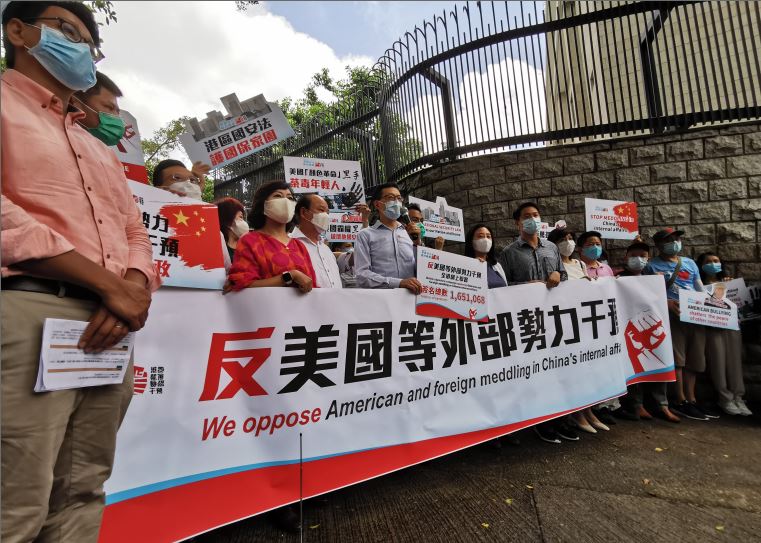


Hong Kong residents hold banners opposing the US and foreign meddling in China's internal affairs in front of the US Consulate General in Hong Kong on July 2.
The US consulate in Hong Kong and Macao tops social media polls on the "US consulate in China most likely to be closed," after the US asked the Chinese consulate in Houston to close, which observers said reflects the Chinese public's anger over US meddling in Hong Kong affairs and a warning to American "intelligence hegemony."
Although the chance of closing the consulate in Hong Kong as a countermeasure may be remote, analysts noted that it would be perfect timing for China to clean up "redundant employees" in the US consulate doing intelligence work.
Observers estimated the US consulate has more than 1,100 employees. In 2019 during the peak of Hong Kong riots, the number of employees was estimated to top 1,600, while employees of the Liaison Office of the Central People's Government in the Hong Kong Special Administrative Region were fewer than 200.
In latest online polls launched by Chinese media outlets, 66 percent of respondents believe the US consulate in Hong Kong and Macao "is most likely to be closed." One poll done by the Global Times on Twitter had more than 11,000 responses, and another one by guancha.cn on Sina Weibo received 46,000 votes.
Yin Hongbiao, an expert on Hong Kong affairs at Peking University, told the Global Times on Thursday that Hong Kong is one of the world's major centers for espionage activities, especially for the UK and the US. International relations experts said the US consulate in Hong Kong has long been serving more as an anti-China camp for the US than a diplomatic facility.
Lü Xiang, a research fellow at the Chinese Academy of Social Sciences in Beijing, said that China should impose a limit on the number of foreign consulate employees.
China does not need to act as reckless as the US and abruptly order a foreign consulate to close, since China always guarantees the convenience of legal activities of foreign citizens. But amid the US-initiated spat, China should clean US intelligence presence in a Chinese city when there are too many Americans doing espionage work in the name of diplomatic needs, Lü said.
After the 1997 handover of Hong Kong, the US consulate increased its staff from 610 to more than 1,000, and one of its tasks is to turn Hong Kong into a "democratic front" and separate it from the country, Chinese observers said.
US Secretary of State Mike Pompeo is former director of the CIA, and the Trump administration's frequent interventions in Hong Kong affairs in recent years have raised wide concerns over the national security situation in Hong Kong.
In August 2019 during the Hong Kong riots, Julie Eadeh, the political unit chief of the US consulate in Hong Kong and Macao, met with secessionist leaders, including Joshua Wong, Nathan Law Kwun-chung and Martin Lee Chu-ming, media reported.
Former CIA employee Edward Snowden said in 2013 that US National Security Agency (NSA) had been hacking computers in Hong Kong and the Chinese mainland since 2009, including those in the Chinese University of Hong Kong, which houses the Hong Kong Internet Exchange. Ninety-nine percent of internet activity in Hong Kong has been passing through it since 1995.
Yin said that the US was responsible for the latest round of diplomatic frictions, which is not in line with mutual benefits. But Donald Trump was determined to use it as his limited anti-China cards in a desperate bid to win the election, and a political legacy to restrict the future administration.
Cai Wei, China's Consul General in Houston, on Wednesday told media that the order to close the Chinese consulate in Houston is political provocation, which seriously violates international law, basic principles of international relations and the bilateral consular agreement.
"We urge the US side to immediately revoke this erroneous decision. Otherwise, China will have to respond with legitimate and necessary actions," Cai said.

 Award-winning photos show poverty reduction achievements in NE China's Jilin province
Award-winning photos show poverty reduction achievements in NE China's Jilin province People dance to greet advent of New Year in Ameiqituo Town, Guizhou
People dance to greet advent of New Year in Ameiqituo Town, Guizhou Fire brigade in Shanghai holds group wedding
Fire brigade in Shanghai holds group wedding Tourists enjoy ice sculptures in Datan Town, north China
Tourists enjoy ice sculptures in Datan Town, north China Sunset scenery of Dayan Pagoda in Xi'an
Sunset scenery of Dayan Pagoda in Xi'an Tourists have fun at scenic spot in Nanlong Town, NW China
Tourists have fun at scenic spot in Nanlong Town, NW China Harbin attracts tourists by making best use of ice in winter
Harbin attracts tourists by making best use of ice in winter In pics: FIS Alpine Ski Women's World Cup Slalom
In pics: FIS Alpine Ski Women's World Cup Slalom Black-necked cranes rest at reservoir in Lhunzhub County, Lhasa
Black-necked cranes rest at reservoir in Lhunzhub County, Lhasa China's FAST telescope will be available to foreign scientists in April
China's FAST telescope will be available to foreign scientists in April